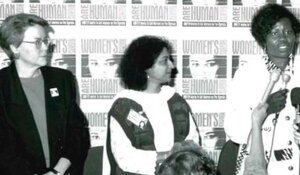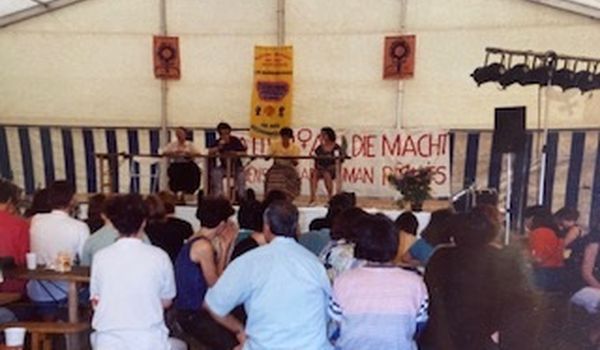Schuster: What are the major achievements related to the slogan "women's rights are human rights"? What were the milestones?
Bunch: The Vienna World Conference on Human Rights in 1993 was the "tipping point" in gaining international acceptance that "women’s rights are human rights" and opened the door to a profound transformational process in how women’s rights and human rights have been seen and pursued over the past 30 years. It made the world take more seriously the abuses of and Violence Against Women (VAW), as fundamental violations of human dignity, rather than dismiss these as a natural and inevitable part of being female.
The biggest Milestone after Vienna was the Beijing World Conference on Women in 1995, the largest UN world conference ever, where the entire Platform for Action was framed as women’s human rights. There have been many advances in the 30 years since Vienna, particularly in the awareness of and expanded attention paid to issues like VAW – from changes in national legislation throughout the world to increasing data on the scale of the problem and to growing resources dedicated to addressing it. Milestones in this process include the appointment by the UN Human Rights Council of a UN Special Rapporteur on Violence Against Women; standard setting on gender-specific forms of persecution and abuse such as the International Criminal Court (ICC) statutes on rape, forced pregnancy, and gender-based persecution which are supposed to become the basis of national laws; and UN Security Council Resolutions and mechanisms on Women, Peace and Security.

Logar: The recognition of VAW as a human rights violation at the Vienna Conference supported women’s NGOs to lobby successfully for better protection for women and the adoption of laws on the national level, such as the Austria Domestic Violence Protection Act 1997. It also facilitated the adoption of a legally binding Convention by the Council of Europe in 2011, on preventing and combating VAW and domestic violence: the Istanbul Convention. This Convention is explicitly mentioning sexual orientation and gender identity as non-discrimination grounds, and this gave rise to resistance to the Convention by ultra-conservative groups in several countries in Europe. Despite this, the Convention was ratified by 37 countries, the vast majority of the 47 member states of the Council of Europe.
Schuster: What have been the biggest setbacks on the global level? What is the meaning of "women's rights are human rights" considering current backlashes?

Bunch: Backlash includes acts of violence against individuals and sometimes it is deadly, but it also takes the form of efforts to shut down programs called "gender ideology" like sex education and women’s studies, as we have seen in Florida in the US, in Hungary, and in several countries in Latin America. Sometimes it is disguised as budget cuts or changing of institutional priorities. But such actions must also be a reminder that feminism and other human rights movements have touched a nerve in challenging patriarchy, racism, and other discriminations. Backlash comes when the work being done is having an impact and particularly as it begins to bring about systemic changes in families, workplaces, and other aspects of life.
Logar: The biggest setbacks on the global level concerning human rights affect women disproportionally. For instance, if we look at the situation of women and girls in Afghanistan: The country has suffered from war and armed conflict for over forty years. It had become a battleground of invading forces following their own geopolitical interests, with the narrative of "bringing democracy" to the country. International powers withdrew in 2021 from the country, leaving an undemocratic, misogynist regime, which bans girls from secondary school. Despite incredible restrictions to human rights which women and girls are facing, many countries do not guarantee safe passages or procedures for refuges. Austria for instance, does not allow a single woman to safely apply for refugee status. Women from Afghanistan and other countries must take enormous dangerous routes for safety, such as the 17-year-old Lara (name changed), who walked from her town in Iraq to Vienna in a six-month journey, to escape from forced marriage and violence of her father. Unfortunately, migrant and refugee women are facing increasing and intersecting discrimination in many European countries. The "Fortress Europe" is a shameful sign of our world situation.
Schuster: What should be the way forward for women’s rights protection? As pioneers and leading figures in the women’s rights movement, what do you recommend to today’s feminists, their different movements, and allies?

Bunch: Young feminists around the world are taking action to address these challenges in many ways. I hope that they can learn from the struggles of those of us who came before, and I try to write and teach in a way that can make some of our strategies as well as mistakes visible to them. Most of all what I want to recommend is that they learn about this history but also recognize that new times always require new strategies, and they must find the way forward for these challenging times. I hope they will both learn to protect and care for themselves as much as possible in order not to burn out too soon. At the same time, it is important to live for what you believe and not to live in fear or avoid making challenges to the systems of oppression out of that fear. Working for human rights and feminism has made my life worth living – providing intensely important learning moments and friendships. I cannot imagine a better way to invest your time and energy than working to make the world a more equitable, less violent, and more sustainable place.
Logar: Actions for democracy and human rights must include women in leading positions. Wars and armed conflicts such as the war of Putin against the Ukraine and other armed conflicts, are signs of patriarchal, manipulative, and imperialist powers, that are aiming for world domination. A rise of militarism and a huge increase in military spending are the consequences, bearing the danger of destroying the planet. This is for me the reason, why I have started to work in the oldest women’s peace organization, the Women’s International League for Peace and Freedom (WILPF). Together with others we have founded the Austrian section. In the legacy of the Vienna Declaration I believe, it is enormously important for the future of the people and the planet, that women’s organizations form alliances and work together with movements against racism and for peace and climate justice (27 June 2023).

